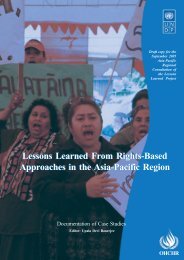View / Download - HRBA Portal
View / Download - HRBA Portal
View / Download - HRBA Portal
You also want an ePaper? Increase the reach of your titles
YUMPU automatically turns print PDFs into web optimized ePapers that Google loves.
Participation of the disabled population in elections in Afghanistan• Conduct outreach programmes that targetmarginalized persons with disabilities in orderto instill confidence in them and allay their fearsand mistrust against mainstream institutions;• Increase local content in all developmentprogrammes and civic/election managementteams, as well as making all programmesless Kabul-centric and reach out to theremotest corners, within the possibilitiesafforded by security conditions, in order toenhance the legitimacy of authorities;• Formulate social and economic empowermentprogrammes that provide private incentives toconstructive choices by beneficiaries, i.e.incentives that are manifestly stronger than theconstraints that limit those choices (such as‘shame’ and ‘honour’ based inhibitions, inaddition to harder and more conventionalconstraints); utilize sociological andpsychological perspectives, such as ‘socialmultipliers’, in addition to the formal logicand rigour of economics to plan andanalyse such interactions and to capture a‘richer’ causal picture of social change;• Fund research and ‘network analysis’studies of associational and membershipgroup so as to open up the multiplicity ofinteractions that contribute to socialnetworks, and leads to a more complexunderstanding of those kinds of networksthat might facilitate trust and activism andthose which do not;• Build the capacity of disabled people’sorganizations active in inclusive governanceprogramming, so that they may identify andreduce the barriers to collaboration andcommunicative action, thereby reducing thepossibilities of value laden assumptions incommunities that lead to stereotyping andunlawful decisions.This study shows that there are still many gaps inour knowledge. Some of the gaps which need to beaddressed by researchers should consist of:• Probing the ‘gendered paths’ of apparentlygender-neutral discrimination, such asinstitutional discrimination;• Exploring poverty-related factors in the nexusbetween poverty and disability, or formingresearch questions that use gender, disabilityand poverty as dependent variables;• Studying variance in discrimination basedon regional, ethnic/racial differences andcustoms, and conducting research onhousehold-based discrimination, its impact inthe public sphere and attendant micro-macrolinks;• Conducting basic research on validatingmeasures and tools in the subject.More innovative programming and emancipatorygoals can only be reached through finer analysisof data and a systematic collection of statisticaland empirical evidence; employing appropriateanthropological and participant-observationmethods; sharper analysis of gender effects/stereotypes/social-relational dimensions ofmarginalized groups and poverty/discriminationtraps; stronger political and donor commitment;greater awareness of the opportunity costs inneglecting the disabled; and a human rights-basedinclusive governance approach.23



